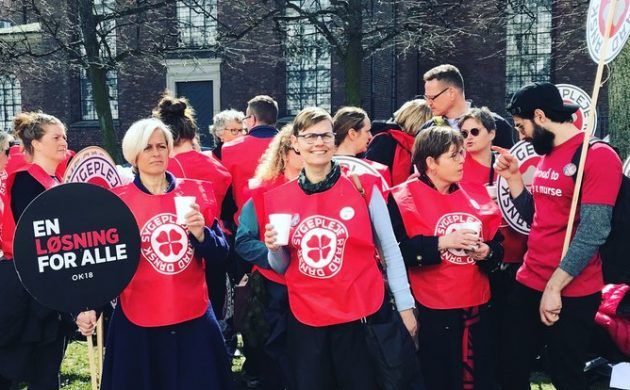Until last week, for more than ten weeks 10 percent of the nurses were on strike in the hope of getting a better deal than their negotiators came up with.
Bizarrely structured
However, the conflicts have had a bizarre structure. The praised Danish labour conflict model recommends the employees and employers fighting it out without any interference from the public authorities – even when the employers are the state or the regions.
It is basically a resources battle: who has the deepest pockets. And it is not rocket science to figure out that the nurses will run out first.
The nurses’ only hand was to exert public pressure on the politicians, chiefly by drawing attention to their heroics during the early days of the pandemic. This in part was what drove them to ask for a pay rise. Equality also came into play, as they argued they had not been rewarded for their work because the majority of them are women.
Striptease in the dark
The red-bloused nurses have been demonstrating, hopping, singing and shouting that they were worth more, but at the end of the day it turned out that it was just a striptease in the dark.
Nobody cared and inevitably the Socialdemocratiet government turned to legislation to end the conflict, so the nurses ended up with the terms they rejected – twice.
Now they can start paying increased conflict fund contributions on top of what they still pay from the last conflict six years ago. One cannot help thinking that the Danish model might be a bit outdated.
Too much dithering
Equally outdated is Denmark’s foreign policy when it comes to participation in armed conflicts in far-away countries. The Afghanistan campaign ended in chaos and now the battle-weary Taliban warriors have their day.
On the Danish side we had to establish airlifts for all Danish citizens, along with Afghans with a Danish connection. At the last count, 40 listed individuals are left behind. Really, though, that is not good enough.
The reason why it did not work better is that most of the political parties spent valuable time discussing how few needed to be taken from Kabul Airport.
Better to talk than fight
The collapse in Afghanistan was indeed faster than anyone expected, but the foot-dragging was an embarrassment. Maybe the demanded investigation will reveal the true shame of the situation.
On thing is for sure. The stream of refugees will increase, and we will see fences and walls being built to control the people. In Afghanistan we can only hope that 20 years without Taliban rule has left enough of an impact on the 40 million-plus population to inspire an evolution towards a society that respects human rights, if not a modern democracy.
The nurses did not succeed in fighting – but negotiations are the answer even if it is hard. Negotiations with the Taliban and Islamic State are next to impossible, but ultimately they’re the only feasible answer.


